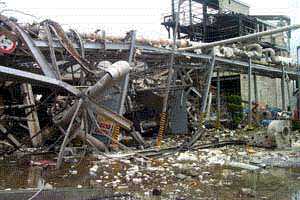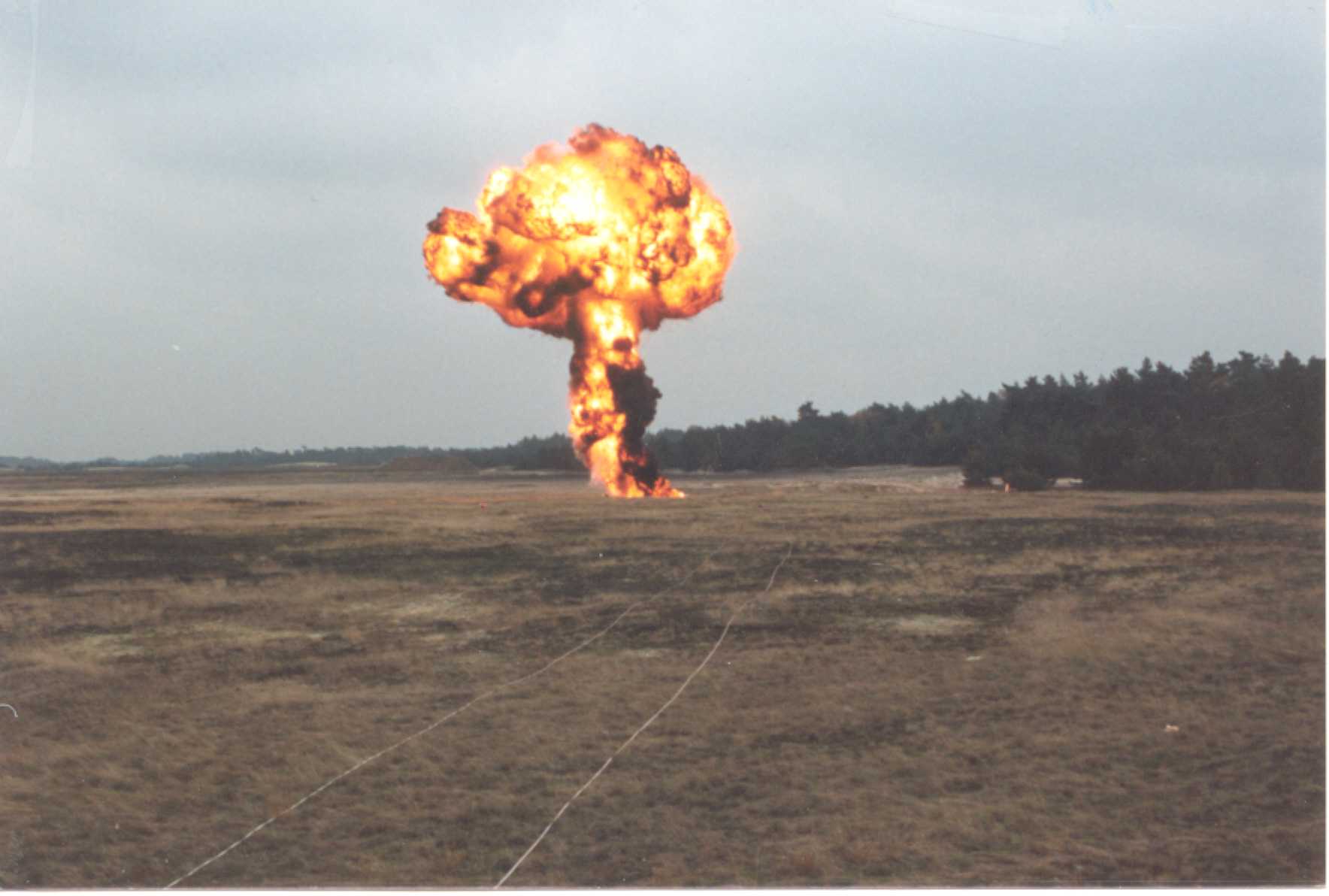| home | introduction | history | working groups
| members | officers | meetings | links | literature |
IGUS :
introduction
 IGUS is an international group of scientific
experts dealing with the explosion risks of unstable substances.
IGUS was set up in 1962 with the aim to harmonise test methods
used by different countries to identify and quantify the
explosive properties of unstable materials. Since then, its scope
has widened to thermal stability, reactivity and flammability of
all kinds of unstable and reactive substances. Over the years,
IGUS has continued to offer scientists who are advisers to their
governments, and others, a forum to exchange data and
information. This exchange takes place primarily in support of
the development of classification regimes to protect society from
hazards of unstable substances and to remove barriers to
international trade. One of the main goals of this exchange has
always been to understand and quantify the resulting effects
(such as the explosion effect as shown right) from accidents
involving dangerous goods.
IGUS is an international group of scientific
experts dealing with the explosion risks of unstable substances.
IGUS was set up in 1962 with the aim to harmonise test methods
used by different countries to identify and quantify the
explosive properties of unstable materials. Since then, its scope
has widened to thermal stability, reactivity and flammability of
all kinds of unstable and reactive substances. Over the years,
IGUS has continued to offer scientists who are advisers to their
governments, and others, a forum to exchange data and
information. This exchange takes place primarily in support of
the development of classification regimes to protect society from
hazards of unstable substances and to remove barriers to
international trade. One of the main goals of this exchange has
always been to understand and quantify the resulting effects
(such as the explosion effect as shown right) from accidents
involving dangerous goods.
Originally, IGUS
was set up under the umbrella of the OECD. Since the framework of
OECD comprises not only economic growth but also quality of life,
the aim of IGUS was, and still is, defined as follows:
Exchange of
information and thoughts on:
» prediction of explosive properties of industrial chemicals,
» phenomenology of explosions,
» testing
with regard to fire and explosion hazards, and
» analysis of accident case histories,
in order to improve safe manufacture, handling, transport and
storage of various kinds of dangerous materials.
Schemes and
criteria for the classification of dangerous substances come
about through the negotitations of policy makers at meetings of
international bodies responsible for agreements. These policy
makers and international bodies are supported by technical
experts. Whilst these experts support their colleagues' national
positions, it is also extremely important that such technical
experts have the means to exchange and discuss freely technical
concerns in detail so that at such meetings progress can be made.
One such forum is IGUS, brought into being more than 40 years
ago. Their 'unstable substances' (and their concerns) focus
mostly around materials like explosives, fireworks, flammable
solids, self-heating substances, self-reactive substances,
oxidisers and organic peroxides.
 Quantifying the dangers inherent in
energetic materials and establishing controls for them brings
together many scientific disciplines. International collaboration
by national laboratories on test method development does occur
and is vital to ensuring rigour in hazard assessment, but the
process is slow. IGUS however has contributed significantly in
this area. IGUS members devote considerable time to examining the
different test methods to identify and improve upon the best
methods that discriminate materials with explosive, flammable and
oxidising properties. A vital feature of any test that may be
used for classification is its reproducibility and this aspect is
probed, sometimes, by 'round robin' testing. If tests are poor in
this respect, then no matter how 'sensible' classification
schemes appear, agreements on classification between national
authorities will not occur.
Quantifying the dangers inherent in
energetic materials and establishing controls for them brings
together many scientific disciplines. International collaboration
by national laboratories on test method development does occur
and is vital to ensuring rigour in hazard assessment, but the
process is slow. IGUS however has contributed significantly in
this area. IGUS members devote considerable time to examining the
different test methods to identify and improve upon the best
methods that discriminate materials with explosive, flammable and
oxidising properties. A vital feature of any test that may be
used for classification is its reproducibility and this aspect is
probed, sometimes, by 'round robin' testing. If tests are poor in
this respect, then no matter how 'sensible' classification
schemes appear, agreements on classification between national
authorities will not occur.
Members of IGUS are experts from the OECD
countries insofar as they are members of government laboratories
and organisations or scientists who are involved in research and
are governmental advisers on a permanent basis. Other
organisations (e.g. universities) may also apply for membership,
under restricted conditions. Membership is open to scientists
from the OECD countries who fulfill the above conditions.
Scientists from non-OECD countries may apply for membership as
independents if similarly engaged. Parts of working group
meetings are also open for experts from industry, after being
invited by the chairman. Independents and industry
representatives are not eligible for office.
There are relatively few
organisations where technical experts can share views and
opinions at a formative stage and exchange information that
benefits their institutes programmes, but IGUS in one such body.
The relationships and respect among the members built up over the
years enables valuable interchange to continue. Increasingly, the
attendance of policy representatives and inspectors at IGUS
meetings as well as joint open meetings with industry and
universities speak for itself in respect to benefits perceived.
The links forged between the national bodies in IGUS in the past
years still provide a good basis for continued discussion and
collaborative work to realising the aims of ensuring the safety
of people and reducing barriers to trade via harmonised testing
and classification schemes.
As new technologies emerge, so
will the need continue for technical discussions and exchange to
underpin international agreements as well as to safeguard society
through the sharing of knowledge about hazards. There are still
many problems to be resolved in the areas of IGUS expertise. Some
topics that continue to be addressed within the working groups
are:
- Tests and criteria for
fireworks, the aim being to enable legislation to be
enhanced by harmonisation of firework types and safety
parameters through wider application of a CEN standard
currently being developed.
- Improving on database
compilation, tests and criteria for self-reactive and
thermally unstable energetic substances, building on and
supporting official international organisations attempts
at global harmonisation of classification regimes;
improving the description of test methods to assist a
third-party certification of bodies using them.
- Correlation of test data from
several institutions to enable comparisons to made so
that some tests might be agreed as redundant, or better
for solids than liquids, etc.
- Continued information
exchange on accidents and incident: to promote safety
awareness and highlight any shortcomings in the tests and
criteria regimes.
- Continued examination and
development of methods to predict, rank and scale the
compounds, phlegmatized products and fuel/oxidiser
mixtures.
- Industrial explosions
knowledge advancement in the areas of dispersion
modeling, obstacles effects, blast yield, deflagration
speeds and transition to detonation.
- Physico-chemical aspects
affecting self-heating, deflagration and detonability of
ammonium nitrate in manufacture.
IGUS continues to offer its
members, and other participants in its meetings, a valuable,
independent and globally operating forum to exchange data,
information and experience in relation to the above-mentioned
topics as well as other items that may arise as a result of
changing regulations, new studies and incidents.
See also the Terms of Reference.
The information on this page is
partly extracted from: Dr. B.J. Thomson, 'International
co-operation in hazardous materials accident prevention', lecture
held at the International Workshop on Safety in the Transport,
Storage and Use of Hazardous Materials, Tokyo, Japan, 11-13 March
1998. Also published in Journal of Loss Prevention in the Process
Industries, Vol. 12 (1999), p. 217-225.
 IGUS is an international group of scientific
experts dealing with the explosion risks of unstable substances.
IGUS was set up in 1962 with the aim to harmonise test methods
used by different countries to identify and quantify the
explosive properties of unstable materials. Since then, its scope
has widened to thermal stability, reactivity and flammability of
all kinds of unstable and reactive substances. Over the years,
IGUS has continued to offer scientists who are advisers to their
governments, and others, a forum to exchange data and
information. This exchange takes place primarily in support of
the development of classification regimes to protect society from
hazards of unstable substances and to remove barriers to
international trade. One of the main goals of this exchange has
always been to understand and quantify the resulting effects
(such as the explosion effect as shown right) from accidents
involving dangerous goods.
IGUS is an international group of scientific
experts dealing with the explosion risks of unstable substances.
IGUS was set up in 1962 with the aim to harmonise test methods
used by different countries to identify and quantify the
explosive properties of unstable materials. Since then, its scope
has widened to thermal stability, reactivity and flammability of
all kinds of unstable and reactive substances. Over the years,
IGUS has continued to offer scientists who are advisers to their
governments, and others, a forum to exchange data and
information. This exchange takes place primarily in support of
the development of classification regimes to protect society from
hazards of unstable substances and to remove barriers to
international trade. One of the main goals of this exchange has
always been to understand and quantify the resulting effects
(such as the explosion effect as shown right) from accidents
involving dangerous goods. Quantifying the dangers inherent in
energetic materials and establishing controls for them brings
together many scientific disciplines. International collaboration
by national laboratories on test method development does occur
and is vital to ensuring rigour in hazard assessment, but the
process is slow. IGUS however has contributed significantly in
this area. IGUS members devote considerable time to examining the
different test methods to identify and improve upon the best
methods that discriminate materials with explosive, flammable and
oxidising properties. A vital feature of any test that may be
used for classification is its reproducibility and this aspect is
probed, sometimes, by 'round robin' testing. If tests are poor in
this respect, then no matter how 'sensible' classification
schemes appear, agreements on classification between national
authorities will not occur.
Quantifying the dangers inherent in
energetic materials and establishing controls for them brings
together many scientific disciplines. International collaboration
by national laboratories on test method development does occur
and is vital to ensuring rigour in hazard assessment, but the
process is slow. IGUS however has contributed significantly in
this area. IGUS members devote considerable time to examining the
different test methods to identify and improve upon the best
methods that discriminate materials with explosive, flammable and
oxidising properties. A vital feature of any test that may be
used for classification is its reproducibility and this aspect is
probed, sometimes, by 'round robin' testing. If tests are poor in
this respect, then no matter how 'sensible' classification
schemes appear, agreements on classification between national
authorities will not occur.